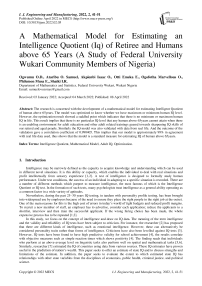A Mathematical Model for Estimating an Intelligence Quotient (Iq) of Retiree and Humans above 65 Years (A Study of Federal University Wukari Community Members of Nigeria)
Автор: Ogwumu O.D., Ataribu O. Samuel, Akpienbi Isaac O., Otti Emeka E., Ogofotha Marvellous O., Philemon Musa E., Shaiki I.R.
Журнал: International Journal of Engineering and Manufacturing @ijem
Статья в выпуске: 2 vol.12, 2022 года.
Бесплатный доступ
The research is concerned with the development of a mathematical model for estimating Intelligent Quotient of human above 65years. The model was optimized to know whether we have maximum or minimum human IQ level. However, the optimization result showed a saddled point which indicates that there is no minimum or maximum human IQ in life. This result implies that there is no particular IQ level that any human above 65years cannot attain when there is an enabling environment for adult education and other adult related trainings geared towards sharpening IQ skills of our retired and aged people. Similarly the IQ model was also validated with data from real life. And the outcome of the validation gave a correlation coefficient of 0.990405. This implies that our model is approximately 99% in agreement with real life data used, thus shows that the model is a standard measure for estimating IQ of human above 65years.
Intelligence Quotient, Mathematical Model, Adult IQ, Optimization
Короткий адрес: https://sciup.org/15018298
IDR: 15018298 | DOI: 10.5815/ijem.2022.02.05
Список литературы A Mathematical Model for Estimating an Intelligence Quotient (Iq) of Retiree and Humans above 65 Years (A Study of Federal University Wukari Community Members of Nigeria)
- Philip Carter. The Complete Book of Intelligence Tests: 500 Exercises to Improve, Upgrade and Enhance Your Mind Strength.
- Gardner, H. Frames of mind: The theory of multiple intelligences. New York: Basic Book.
- Veas, A., Gilar-Corbi, R., & Miñano Pérez, P. (2016). The Influence of Gender, Intellectual Ability, Academic Self-Concept, Self-Regulation, Learning Strategies, Popularity and Parent Involvement in Early Adolescence. International Journal of Information and Education Technology, 6(8).
- Joko S., Gaguk M., and Wardani R., (2018). The Effect of Intelligence Quotient (IQ), Self-Regulated Learning, Mathematical Disposition, and Logical Thinking Ability Towards the Problem Solving Ability of Geometry in State Junior High School Students in Bandar Lampung City. Journal of Education and Practice (JEP), Vol.9, No.8, 2018. ISSN 2222-288X (Online).
- Karsim, K., Suyitno, H., & Isnarto, I. (2017). Influence of IQ and Mathematical Disposition Toward the Problem Solving Ability of Learners Grade VII through PBL Learning Model with The Assistance LKPD. Unnes Journal of Mathematics Education, 6(3)
- Yıldızlı, H., and Saban, A. (2016). The Effect of Self-Regulated Learning on Sixth-Grade Turkish Students’ Mathematics Achievements and Motivational Beliefs. Cogent Education, 3(1), 2.
- Lynn, R. and Vanhanen, T. (2002). IQ and the wealth of nations. Westport, CT: Praeger. ISBN 0275-97510-X
- Moenikia, M., and Zahed-Babe lan, A. (2010). A Study of Simple and Multiple Relations between Mathematics Attitude, Academic Motivation and Intelligence Quotient with Mathematics Achievement. Procedia-Social and Behavioral Sciences, 2(2).
- Philip Carter. Advanced IQ Tests: The Toughest Practice Questions to Test Your Lateral Thinking Problem Solving and Reasoning Skills.
- Robert J.S., (2015). Successful Intelligence: A Model for Testing Intelligence beyond IQ Test. European Journal of Education and Psychology, 8(2):76-84. ISSN1888-8992, https://doi.org/10.1016/j.ejeps.2015.09.004
- Rindermann H., Becker D. and Coyle T.R., (2016). Survey of Expert Opinion on Intelligence: Causes of International Differences in Cognitive Ability Tests. Journal of Frontiers in Psychology. 7(2016): 399. ISSN 1664-1078. DOI:10.3389/fpsyg.2016.0039.
- Noonan, B., Tunney, K., Fogal, B., & Sarich, C. (1999). Developing Student Codes of Conduct: A Case for Parent-Principal Partnership. School Psychology International, 20(3), 289–299. https://doi.org/10.1177/0143034399203004.
- Azuka B.F., and Kurumeh M.S., (2015). Effects of Emotional Intelligence Skills Acquisition on Students’ Achievement in Senior Secondary School Geometry in Keffi Education Zone, Nasaraw State, Nigeria. Asian Journal of Education and e-Learning. Volume (3).
- Azuka B.F., (2012). The Relationship between Emotional Intelligence and Academic Achievement of Senior Secondary School Students in the Federal Capital Territory, Abuja. Journal of Education and Practice. Vol 3, No 10 (2012)
- Onwuka, P.I. (2014). Effects Constructivist Based Instructional Stratecy on Students’ Learning Outcome in Mathematics. The Eurasia Proceedings of Educational & Social Sciences (EPESS), 2014 Volume 1, Pages 327-330
- Shekufe M., Fatemeh F., Dokohaki S., Mohammad M.F., (2013). Artificial Intelligence Design Waterfronts and Particular Places Management to Improve Relationships between People. International Journal of Intelligent Systems and Applications (IJISA), vol.5, no.9, pp.58-66, 2013.DOI: 10.5815/ijisa.2013.09.07
- Salovey, P., & Mayer, J. D. (1990). Emotional Intelligence. Imagination, Cognition, and Personality. 9:185-211. https://doi.org/10.2190/DUGG-P24E52WK-6CDG
- Boyatzis, R. E., Goleman, D., & Rhee, K. (2000). Clustering competence in emotional Intelligence: Insights from the Emotional Competence Inventory (ECI). Handbook of emotional Intelligence, 99(6), 343-362.
- Iryna P., Iryna P., (2017). Deep Hybrid System of Computational Intelligence with Architecture Adaptation for Medical Fuzzy Diagnostics. International Journal of Intelligent Systems and Applications (IJISA), Vol.9, No.7, pp.12-21, 2017. DOI: 10.5815/ijisa.2017.07.02
- Feinkohl, I., Kozma, P., Borchers, F., (2021). Contribution of IQ in Young Adulthood to the Associations of Education and Occupation with Cognitive Ability in older age. BMCGeriatr 21, 346 (2021). https://doi.org/10.1186/s12877-021-02290-y
- Ratcliff, R., Thapar, A., & McKoon, G. (2010). Individual differences, aging, and IQ in two-Choice tasks. Cognitive psychology, 60(3), 127–157.https://doi.org/10.1016/j.cogpsych.2009.09.001
- Ratcliff, R., Thapar, A., and McKoon, G. (2011). Effects of aging and IQ on item and associative Memory. Journal of experimental psychology. General, 140(3), 464–487.https://doi.org/10.1037/a0023810.
- Ogwumu Onah.David, Kyagya T.Yusuf, Amkoromo Grace.I., Keto, Kingsley M., Ezeh A.Tochukwu, Ogofotha Marvellous O., Elugah Joseph.I., (2020). Mathematical Model for Predicting the Rate of Human Happiness: A study of Federal University Wukari Community of Nigeria. International Journal of Mathematical Sciences and Computing (IJMSC), Vol.6, No.6, PP. 30-41, 2020. DOI: 10.5815/IJMSC. 2020.06.05.


